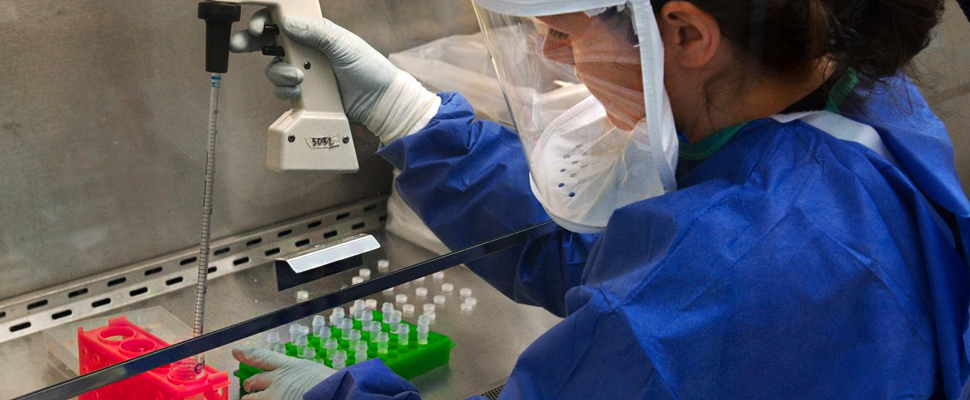Did the new virus reach Latin America?
Currently, cases of possible infected persons in Mexico, Colombia and Brazil are being investigated, but WHO said that these have not yet been proven.

Woman performing tests in a laboratory. / Photo: Pxhere – Reference Image
LatinAmerican Post | Juliana Suárez
Listen to this article
Leer en español: ¿Llegó el nuevo virus a América Latina?
Wuhan's coronavirus, as it has been called by the Chinese city where it began, has spread rapidly throughout the country and many others in Asia.
In recent days, while the virus reaches a number of more than 500 infected, in Latin America began to hover the news that some countries had their first patient. The symptoms, being as common as those of a common cold, must be analyzed carefully before being able to ensure that this new and possibly lethal disease is in effect.
In Mexico, the federal government reported that there were three possible cases of coronavirus in one of its states, Jalisco. The Ministry of Health said that one of the people is a 42-year-old man who arrived from China on January 10, specifically from the city where the outbreak began.
In Brazil, something similar happens. A woman arrived in Belo Horizonte in the days of mid-January from China, from Shanghai, and began to suffer from the symptoms.
The virus has not yet been confirmed in these two countries and the relevant examinations are being made for each of the possible infected.
On the contrary, in Colombia the possible infected person was a Chinese citizen who arrived in the country on January 22 and suffered symptoms. The Ministry of Health was in charge of applying the necessary tests to determine if the strain of the virus that the man presented was that of the new one from China. However, the ministry confirmed that it is a case of influenza but not the coronavirus.
"La persona que fue examinada el día de ayer había pasado por China y dos países más. Fue sometida a los estudios pertinentes y los resultados arrojaron positivo para influenza tipo B. No tenía el coronavirus de China" ministro (e) #IvánGonzález
— MinSaludCol (@MinSaludCol) January 23, 2020
Likewise, the Colombian government assured that it will be in charge of following international health protocols and applying the necessary tests to people coming from countries where contagions have already been confirmed.
Health emergency
The alarms worldwide ended up when the World Health Organization (WHO), after joining with researchers and scientists, was able to determine that the virus is spread among people, and not through an animal such as swine and avian flu.
Therefore, the WHO convened an Emergency Committee last Thursday in which the scope of the outbreak and the steps to be followed were discussed. In this committee, the organization confirmed that the virus has spread rapidly and confirmed 584 cases and 17 deaths. Of them, 575 and all deaths have occurred in China.
"Make no mistake. This is an emergency in #China, but it has not yet become a global health emergency.
WHO’s risk assessment is that the outbreak is a very high risk in China, and a high risk regionally and globally"-@DrTedros on new #coronavirus
— World Health Organization (WHO) (@WHO) January 23, 2020
Given the situation, the organization determined that while security measures must be taken to prevent further propagation, it is still too early to declare a global public health emergency, although in China it already is.
Likewise, although it was proven that the contagion is from human to human, this was determined that it is only happening in China and still does not occur in other countries where there are already cases, but that it can happen. For this reason, it requested special care from the workers in the health sector, who are more exposed to the virus if they arrive in any country.
Also read: What is known about the new and mysterious epidemic
Regarding the possible cases in other parts of the world, such as the cases of Latin America, it affirmed that it is not yet known with certainty and they are still being investigated. "We are aware of the media reports of suspicious cases in other countries, but those cases are just being investigated," said Dr. Tedros Adhanom Ghebreyesus, WHO Director General.
For now, the countries in which the virus is confirmed are Singapore, Korea, Japan, Thailand, Vietnam and, the only one outside of Asia, the United States.
While everything is clear, as there is still a lot of unknown information, the need to prevent has been emphasized. For this, WHO and PAHO (Pan American Health Organization) have given basic recommendations that can help prevent the spread such as hand washing, avoid contact with farm animals and cook animal products well, among others.
Conoce más sobre el #coronavirus y protégete siguiendo estas recomendaciones https://t.co/Ei8juJUxXc… pic.twitter.com/mrse5NsiaK
— OPS/OMS Colombia (@OPSOMS_Col) January 23, 2020




